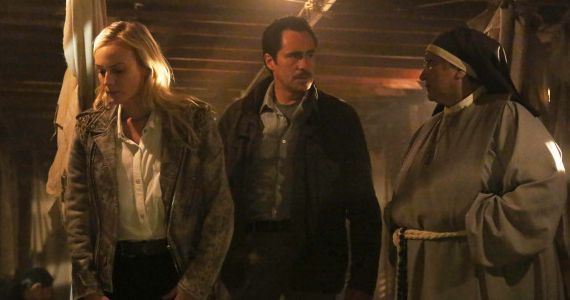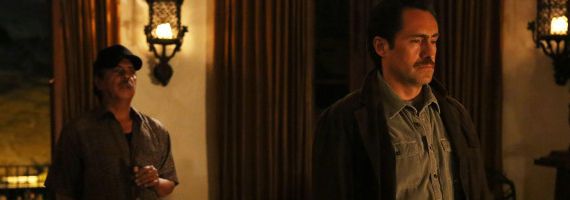It's safe to say that from where The Bridge began – with its interesting depiction of characters and the unique landscape they inhabited, or even the social and political themes and discussions such a potentially volatile place evoked – the story managed to twist in on itself and deliver something far more personal and singular from a character standpoint, but perhaps a little hackneyed and somewhat banal from the perspective of the viewer.
David Tate is of course the man behind all the mixed political and social messages, and the one who drove the plot for so many episodes mid-season. So his contribution to the series from a storytelling standpoint is undoubtedly important, while his importance from a quality standpoint is somewhat dubious. Chances are, though, if you enjoyed those early first episodes where the larger message the killer was attempting to communicate seemed to hold a great deal of importance for not only the characters, but also the world they lived in – i.e., along the El Paso-Juárez border – to see that scope narrowed from thousands of people to one man took a lot of wind out of the season's sails.
It was a risk, and it would be unfair to say The Bridge was unsuccessful, because the writers did manage to fill the face-off between Marco Ruiz and David Tate with considerable tension, high emotional stakes and a sour conclusion that's still somewhat uncommon, even in this day and age known as the Twilight of the Anti-Hero.
To the show's credit, it has to be difficult to take a large story about a specific time and place (present-day El Paso-Juárez) and transform that it midstream into one that is about a singular motivation (vengeance), primarily directed at a single person (Marco – though Daniel Frye now has the hospital bills to prove otherwise). Additionally, the show actually did a nice job transitioning the focus from tensions between countries and the disparity of the living conditions therein to the familiar cop-drama angle of angry guy seeks to hurt cop by kidnapping his family, and then back again.
In fact, when 'The Crazy Place' concludes, it's clear that, as the series heads into season 2, the story has already been determined to a certain extent. More importantly, however, the larger aspect the narrative seemed primed to tackle early on – i.e., the missing girls of Juárez – is now central to the ongoing plot and also preemptively explains not only how these characters will continue to be involved with one another, but also why – an aspect the series seemed to have lost track of while dealing with the Tate storyline and adhering so rigidly to the original Scandinavian version of the show.
Although Tate's crimes proved a sometimes-interesting distraction, they proved to have nothing to do with the larger, more frightening notion of The Beast, or with providing answers to all the pink crosses scattered about Juárez. Those sad, horrible little reminders of the lives that have been lost could serve as the focal point to the second season in a way the dead bodies on the bridge weren't allowed to. Unlike the murdered judge and Juárez woman, the missing girls and the legend of The Beast began long before we knew anything about Sonya Cross, Marco Ruiz or even David Tate, and, in all likelihood, will continue to be a problem. This is a complex, ongoing issue that likely isn't going to be solved within a series like The Bridge, but rather it will serve as the framework for creating a more compelling milieu in which these character's stories can take place.
Focusing on a larger, city-wide problem that can't be easily wrapped up with the arrest of one fringe lunatic on a bridge may better allow the series to achieve the kind of weird but thoughtful storytelling that its first few episodes swam around in, before 'Vendetta' irrevocably changed the course of the season (and many people's opinions of the series).
Because the structure of the season was out of the ordinary – Tate's vendetta wound up feeling more like a wild tangent, rather than the main plot – so much of 'The Crazy Place' affords The Bridge an opportunity to make certain connections that would have otherwise comprised at least the first two episodes of season 2. For one thing, Charlotte's abrupt notification that she's being watched by a government agency certainly adds another dimension to her increasingly bloody pursuit of the American Dream down at the Millwright ranch. But her connection to Fausto Galván, who is, in turn, being courted by Marco to help him exact revenge on Tate actually creates a potentially interesting bridge (sorry) that may finally bring Charlotte, Ray and Cesar closer to the main narrative – whatever that may wind up being.
Overall, it was an occasionally bumpy ride for the The Bridge in season 1, but one with characters who were interesting enough to keep even a modest fan around for all 13 episodes, even if the action wasn't. If you abandoned it, I can't say as though I blame you, but with the conclusion of the Tate storyline (aside from Marco's revenge plot) the series has now been opened up for the writers to tell the kind of intriguing tale they can only tell on the El Paso-Juárez border – the one that seemed to be on the horizon before David Tate took everything to the crazy place.
_____
The Bridge season 2 will premiere sometime in 2014 on FX.



